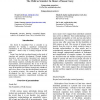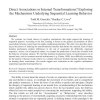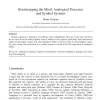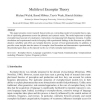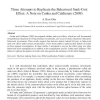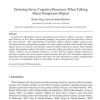COGSCI
2010
13 years 11 months ago
2010
COGSCI
2010
13 years 11 months ago
2010
We evaluate two broad classes of cognitive mechanisms that might support the learning of sequential patterns. According to the first, learning is based on the gradual accumulation...
COGSCI
2010
13 years 11 months ago
2010
Human cognition is striking in its brilliance and its adaptability. How do we get that way? How do we move from the nearly helpless state of infants to the cognitive proficiency t...
COGSCI
2010
13 years 11 months ago
2010
This paper presents recent research that provides an overarching model of exemplar theory capable of explaining phenomena across the phonetic and syntactic strata. The model repre...
COGSCI
2010
13 years 11 months ago
2010
People are remarkably smart: They use language, possess complex motor skills, make nontrivial inferences, develop and use scientific theories, make laws, and adapt to complex dyna...
COGSCI
2010
13 years 11 months ago
2010
Cunha and Caldieraro (2009) investigated whether sunk-cost effects, which are well documented in hypothetical situations involving monetary investments, also occur in choice situa...
COGSCI
2010
13 years 11 months ago
2010
Judging similarities among objects, events, and experiences is one of the most basic cognitive abilities, allowing us to make predictions and generalizations. The main assumption ...
COGSCI
2010
13 years 11 months ago
2010
The contributions to this special issue on cognitive development collectively propose ways in which learning involves developing constraints that shape subsequent learning. A lear...
COGSCI
2010
13 years 11 months ago
2010
In numerous experimental contexts, gesturing has been shown to lighten a speaker's cognitive load. However, in all of these experimental paradigms, the gestures have been dir...
COGSCI
2010
13 years 11 months ago
2010
A well-established principle of language is that there is a preference for closely related words to be close together in the sentence. This can be expressed as a preference for de...
